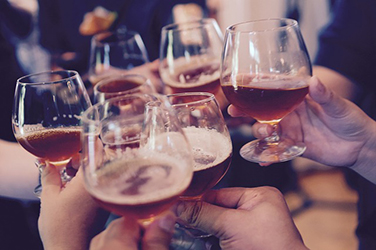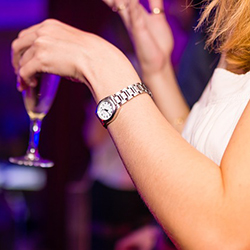In my last post, I wrote about the science of blackouts. Today, I am going to share some tips from my book, “Drink Less Be More: How to have a great night (and life) without getting wasted,” on how to avoid blackouts and other unwanted results of drinking too much.
Getting ready. Changing your “pre-gaming” activities can help set the tone for the evening, and help ensure that you are starting off on the right foot, so to speak. Decide how much you are going to drink before you even leave the door, and follow these strategies to make sure you don’t stumble over the line into oblivion.
Eat something! This may seem obvious, but having food in your stomach slows the absorption of alcohol into your bloodstream and will help delay the effects of alcohol, which will help you stick to your intentions. Proteins and fats take longer to digest, so they’ll stay in your system longer into the evening.
Pre-drinking. My best friend and I used to polish off a bottle of champagne before heading out to the first venue of the evening. Drinking bubbly felt like a treat, a celebration, and that’s often exactly the feeling we were going for, as we sought to shed the stress of the week.
This was a hard habit to break. We were still fans of the bubbly, so we sought out non-alcoholic versions.
Hold up! How many times have you sat down at a restaurant table, and immediately began perusing the wine list? Or ordered a cocktail while waiting for your party to arrive? To combat this automated response, I like to implement the “arrive and assess” strategy. Give yourself 30 minutes after arriving somewhere to check in with yourself, see how you feel, and try something different. This simple step will help you reset your evening in a big way.
At a restaurant? Ask what kind of delicious non-alcoholic offerings there are on the menu. Arriving at a bar or club? Try a sparkling water with a splash of fruit and a lime wedge. Set the timer for 30 minutes before you order your first cocktail.
Drink water. Alcohol is a diuretic, which means it makes you pee more, which can lead to dehydration. Not only does this lead to hangovers, but a dehydrated brain doesn’t function as well, which will compound how you feel the effects of alcohol.
You needn’t make your water drinking obvious – you can ask the bartender for sparkling or still water over ice with a few slices of lime or lemon. Drinking out of fancy glassware makes drinking water more appealing and more delicious, while cutting down on public scrutiny, judgement, and having to answer unsolicited questions about why you aren’t drinking alcohol. You may also want to adopt a two-to-one ratio for water (or other non-alcoholic drinks) to booze.
Ask the bartender. Get fancy! Cutting back on alcohol doesn’t have to be boring. One of my favourite things to do is to ask the bartender to concoct the most delicious creation sans-alcohol that he or she can come up with. Any good mixologist will love the challenge.
Drink slowly. Sip your drinks. Pick the slowest drinker in the group and pace yourself with them. I remember before I started trying to cut back on my alcohol intake, I couldn’t believe how “slow” some people drank. Not surprisingly, it was the slow drinkers that still had their “ish” together at the end of the night.
Knowing when “enough is enough.” It’s a skill that many of us are not taught; to the contrary, in our culture of excess we often feel like we need more, more, more! Setting your intentions before you go out can help with your internal barometer of when enough is enough. The more clear you can feel about what you really want, the more you’ll know if you’ve achieved it, and if you are not going to, then when to call it quits.
It is also important to do the inner work necessary to avoid repeating the same cycles. If you have experienced a blackout in the past and have lingering feelings of shame, regret, embarrassment or sadness, give yourself some extra love and forgiveness.
If you are a friend on the receiving end of hearing of someone else’s blackout, make sure to offer them safety, non-judgment and support instead of laughing it off or minimizing it.
What are your favourite strategies for drinking less to maximize fun? Share them in the comments – we’d love to hear!
Author: Caitlin Padgett has been working for over twelve years in peer and community-based HIV/AIDS, harm reduction, public health, and human rights programs. She is the author of Drink Less Be More: How to have a great night (and life) without getting wasted.
To learn more about Caitlin and her work, please visit her website www.caitlinpadgett.com
**Please note that the material presented here does not necessarily imply endorsement or agreement by individuals at the Centre for Addictions Research of BC



